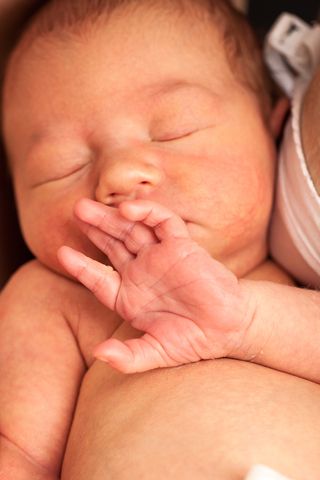The Dehydrated Baby and Breastfeeding - The Signs to Look Out For
Babies have a high metabolic rate, coupled with a relatively small amount of bodily fluids. For these reasons, dehydration in infants is much more common than in adults.

Dehydration occurs when the body lacks enough fluid to perform normal functions. This is a particularly serious concern for babies, as their small size makes them dehydrate quickly.
Water is essential for every cell in the body and plays several important roles, including temperature regulation, supporting organ and tissue health, transporting nutrients to cells, and ensuring the proper functioning of all body systems.
Babies lose water through various processes, including urination, bowel movements, sweating, crying, and breathing, and it is replaced through drinking. However, certain factors, such as vomiting, diarrhea, nursing strikes, and bottle-feeding difficulties, can disrupt the balance between fluid loss and replacement, leading to dehydration.
It's important to note that infant hydration involves more than just water - babies also need the electrolytes (contained in breast milk), such as salt, to maintain proper fluid balance. Dehydration can be classified into three types: water loss, electrolyte deficiency, or a combination of both.

Signs of Dehydration in Babies
Some symptoms of dehydration in babies are relatively easy to pick up, but by then, it may be pretty serious. Often, dehydration in a baby accompanies a viral or bacterial infection, which increases temperature and, thereby, fluid loss.
Dehydration in a baby may be accompanied by the following:
- Sunken eyes.
- Sunken fontanel.
- Unusual sleepiness.
- Dry mouth.
- Dark urine.
- Dry lips and skin.
- Rapid breathing.
It's important to ensure that your baby is adequately hydrated, even if there aren't obvious signs of dehydration. A good way to monitor your baby's hydration status is to check for wet and soiled diapers - in newborns, there should be at least one wet and soiled diaper after most feedings or at least every few hours. If you notice that your baby is producing fewer wet and soiled diapers than usual, or if the diapers are dry and/or infrequent, it may be a sign of dehydration.
Causes of Dehydration
Infants are more prone to dehydration than adults because their bodies contain a higher percentage of water (78% in newborns, compared to around 60% in adults), and they have a higher metabolic rate, which means they use water more quickly. There are several reasons why infants may become dehydrated, diarrhea, constipation, fever, exposure to high temperatures, refusal to eat, and vomiting. In newborns and young infants, dehydration is often caused by a failure to consume enough fluids through feeding to replace what is lost throughout the day.

The Tushbaby Hip Carrier
With its ergonomic design and comfortable waistband, Tushbaby provides optimal support for you and your baby. Say goodbye to shoulder and back pain from traditional carriers, as Tushbaby evenly distributes your baby's weight, relieving strain and promoting better posture.
Dehydration Treatment
If your child's dehydration is mild, your doctor may recommend treating them at home while monitoring their symptoms closely. To do this, you should keep track of your child's feedings and wet diapers, move them to a cool place and remove excess clothing or blankets if it is very warm, offer them a bottle or breastfeed frequently if they are not taking in much at each feeding, and avoid giving them any other drinks (such as oral rehydration fluids, water, juice, or soda) unless directed to do so by a doctor.
It is important to note that severe dehydration requires medical attention and may need to be treated with fluids given intravenously (through a vein) or through a nasogastric or gastrostomy tube. If you are concerned that your baby may be dehydrated, it is important to contact a healthcare provider for guidance.
Preventing Dehydration In Infants
- Monitor wet diapers and weight gain.
- If you are bottle-feeding, offer 1-3 ounces of infant formula or pumped breast milk every 2-3 hours, and if you are breastfeeding, put your baby to the breast at least every 2-3 hours around the clock.
- Avoid taking your newborn or young infant outside in very hot or humid conditions, and keep them in the shade and as cool as possible if you need to be outside.
- Do not give your baby water between feedings unless directed to do so by a healthcare provider - breast milk and infant formula provide both fluids and nutrients.
- Wash your hands often and ask sick family members and friends not to visit your child, particularly if they are a newborn or young infant.
Babies and dehydration ~ When to Seek Help.
Call the doctor if your child refuses to feed, seems lethargic, and has not had a wet nappy for several hours. If she cries without tears and her skin feels cold and damp, it is a good idea to seek medical attention. A skin pinch can also tell you that your baby is dehydrated. If the skin does not return to normal immediately after a gentle pinch, this is a sign of a dehydrated baby.
Dehydration in a baby can be prevented by always ensuring an adequate fluid intake. If your baby is breastfed, it is unlikely that she will become dehydrated unless she has a fever or illness.
